Dr. SHUI Guanghou's team from the Institute of Genetics and Developmental Biology of the Chinese Academy of Sciences has recently revealed perturbations in a diverse array of metabolic pathways across human aging.
Aging is a process associated with multiple-organ function decline and metabolic changes, characterized by enhanced susceptibility to a variety of diseases. Altered blood metabolome in the process of human aging can reveal gerontological markers and uncover underlying mechanisms that enhance the susceptibility to aging-related diseases.
Liquid chromatography coupled to high-resolution mass spectrometry (LC-HRMS) is currently the most frequently applied analytical platform for metabolome profiling in biomedical research. However, two bottleneck questions still puzzle the LC-HRMS application with regarding to accurate identification and quantification of metabolites, particularly for the analysis of plasma metabolome due to its inherent complexity and complicated matrix, frequently leading to missing or erroneous interpretation of metabolomics data.
In this study, the researchers firstly constructed a precise metabolomics method by introducing a series of metabolite isotope standards (ISs), highly covering major classes of plasma endogenous metabolome, to calibrate MS data of the identified metabolites to overcome signal fluctuations of instrument detector and interferences of matrix effects. And 4.5% coefficients of variations reduction of 480 identified metabolites in quality control samples was achieved.
In addition, the function of these adopted ISs were expanded to assist the identification of unknown metabolites (UMs) according to the similar MS signal fluctuations and adjacent retention time between UMs and ISs across the detection of the entire batch samples, based on the principles that they share similar chemical classes, structure, functional groups, and djacent molecular weights.
Subsequently, this constructed precise metabolomics revealed plasma metabolome changes across aging in human cohorts, with age distributions from 20 to 88 years old that many aging-associated metabolic pathways, such disturbed steroid metabolism, amino acids metabolism, lipid metabolism, purine metabolism, and urea cycle, were correlated to cardiovascular diseases, including chronic kidney diseases, fatty liver, diabetes, cancers, etc.
These discovered metabolic mechanisms provide clues and guidance on the prevention and treatment of these age-related diseases.
Results of this study have been published online in
Small Methods on May 8.
This work was supported by the National Key Research and Development Program of China and the National Natural Sciences Foundation of China.
Multiscale embedded correlation network analyses (MECNA). MECNA illustrates the differential correlation between various metabolites in young (n=72) and old (n=71) groups. (Image by IGDB)





